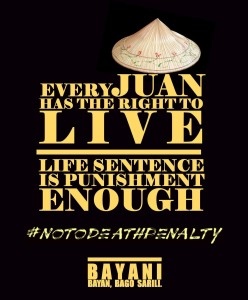Int’l expatriate network slams moves to revive PH death penalty
SAIPAN — As the Philippines moves closer to reinstating the death penalty, a new group claiming worldwide membership denounced the measure.
BAYANi (Bayan Bago Sarili) describes itself as a group of a global Filipinos advocating “selfless love of country and the preservation of truth, justice and democracy.”
The death penalty was abolished by Gloria Macapagal-Arroyo in June 2006 amid increasing pressure on the government.
The House of Representatives has approved a proposal on March 1 to bring back the death penalty. The bill, when passed into law, will punish drug-related offenses with death along with so-called heinous crimes, which include some forms of rape and murder.
The death penalty bill is scheduled to have a symbolic third reading in the House before going to the Senate. Both legislative branches are controlled by allies of President Duterte. It becomes a law when signed by the president. “Every JUAN (a namesake for Filipino) has a right to LIFE, a right to LIVE,” summarizes BAYANi’s opposition to death penalty.
Saipan-based Dr. Celia Lamkin, BAYANi’s founder and prime mover, considers the death penalty as too drastic and too final.
“We have heard of cases wherein the accused have been declared guilty of rape and murder by the courts; have languished in jail, but were later on found to be not guilty,” she explained.
Dr. Lamkin cited the case of Paco Larrañaga who was convicted in 1999, along with six others for the July 1997 kidnapping, rape and murder of sisters Marijoy and Jacqueline Chiong.
Although the Philippine Supreme Court in 2004 affirmed Larrañaga’s conviction and sentenced him to death by lethal injection, widespread support including that of Amnesty International created nationwide pressure to free Larrañaga. He was transferred to a jail in Spain.
BAYANi’s co-founder Bonggo Calawod echoes the same apprehension, saying that in a society where the justice system is flawed, there is always a chance of error.
Information released in 2004 by the Supreme Court of the Philippines cited a 71.77 percent judicial error rate in capital cases in the period from 1993 to 2004, when capital punishment was still legal, a percentage determined by the total number of death convictions that had been either reversed or pardoned. During this time, 651 of 907 convicted persons were saved from lethal injection due to wrongful conviction.
The bill to reinstitute capital punishment is perceived as being railroaded by House of Representative members who are allies of President Rodrigo Duterte to support his campaign pledge to end crime and corruption.
Gerald Miranda, Philippine country chair of BAYANi regards the death penalty as anti-poor. “This measure will further highlight the inequalities in Philippine society. The poor, who cannot afford a good lawyer will end up getting the death sentence – no matter how guiltless, while the rich can always bail themselves out,” he said.
John Logronio, BAYANi Malta country chair shares the same sentiment. Both agree that the lawmakers should instead work on fixing the justice system and go for a humane, pro-life, correctional system.
“Life is precious, and the government has the responsibility to ensure that it is respected and valued,” says BAYANi Hawaii State Chair Ilalo Parayno. He emphasizes that “a government that supports death penalty commits murder, and a government-approved murder (via death penalty) is definitely unacceptable in a civilized world.
Logronio, adds, “Life sentence for a heinous crime is already a penalty. Let a man who is guilty of his crime suffer such penalty for a lifetime.”
Rosalinda Lobris Detras, BAYANi country chair in The Netherlands expresses concern that the Filipinos are starting to be known as pro-death. “We already have been known to condone extrajudicial killings. If our lawmakers succeed in passing into law the death penalty, what message are we sending to the world – a nation that kills its citizens, and a people that enforces the most barbaric form of punishment?”
The BAYANi statement says it is now mobilizing its members to contact their representatives in the House to oppose the passing of the death penalty bill even though President Duterte’s allies dominate the institution.



